We hear the word science everyday. But what is science? We rarely ask that. We think any complicated ideas and ‘modern’ sounding names are science. We’ve associated science with this complex voodoo that only some out of world ‘brainy’ people can understand. After all we’ve the phrase ‘It’s not rocket science’ to describe the subject that isn’t difficult to understand.So if you guys promise to not hide under the bed screaming ‘Science’; let’s talk science.
So What is science?
Many students may think science is a collection of isolated and static facts listed in a textbook. But that’s not all. Science is a process of understanding the nature. Probably the most popular definition is given by science educator and astrophysicist Carl Sagan, He said, ”Science is a self correcting process.” He also said, ”Science is a way of sceptically interrogating the universe with a fine understanding of human fallibility. If we are not able to ask skeptical questions, to interrogate those who tell us that something is true, to be skeptical of those in authority, then we’re up for grabs for the next charlatan, political or religious, who comes ambling along.”He further said,” Science is much more than a body of knowledge. It is a way of thinking. This is central to its success. Science invites us to let the facts in, even when they don’t conform to our preconceptions.”
You may say blah blah blah ,Yeah science is a learning process, I understand. But Why science? Why is science important?
You may say blah blah blah ,Yeah science is a learning process, I understand. But Why science? Why is science important?
Let me answer that. Science is important because we humans are born with curiosity. We try to understand WHY? (A fine example is you just asked WHY is science important? See that!!) We are curious about the world around us, about universe or about the girl next door. And that curiosity is at the center of creativity and invention. All these inventions, they’re the product of human curiosity. And scientific method gives the framework to turn our natural curiosity into knowledge and understanding to solve problems or to invent things. Scientific method is all about observation, hypothesis, experiment and interpretations. You observe something, some phenomenon; you make certain claim (hypothesis) about or to describe such phenomenon; you test or experiment your claims and lastly you interpret the results of experiment. See ,it’s simple. But remember science is a self correcting process. Ask new questions, test them and refine and expand your knowledge accordingly. So in a sense, Science is ongoing process.
Self correction and objectivity are the main characteristics of scientific method which distinguish it from other methods of understanding. I think we must teach students about this while teaching science. Science is more than a textbook. It’s in everyday life and it’s fun. So let’s teach our kids to be curious. As George Carlin famously said, ”Don’t just teach your children to read…Teach them to question what they read. Teach them to question everything.”
I wish you all happy World Science Day for Peace and Development (November 10), theme for this year is Quality Science Education: ensuring a sustainable future for all. We anotherverse team are trying to promote science and science education. Let’s science. Be that curious cat.
And lastly, We would like to remember Carl Sagan: The legendary astronomer, astrophysicist, cosmologist and science educator. He would have been 80 yesterday if he were with us. Come to think of it he is still with us we are all made out of star stuff after all.
Happy Birth day Carl!
Originally published on anotherverse (2014/11/10).


